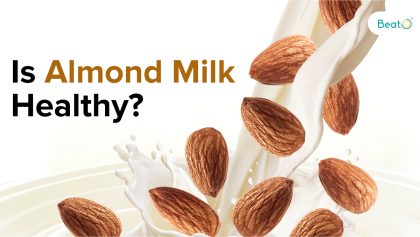Almond milk is a popular dairy-free alternative that has been gaining traction due to its numerous health benefits. This plant-based milk is made by blending almonds with water and then straining the mixture to remove the solids. The resulting liquid is a rich, creamy milk packed with nutrients and offers various health benefits.

Nutritional Powerhouse
Almond milk is an excellent source of Vitamin E, containing 22% of the recommended daily intake. Vitamin E is a powerful antioxidant that protects your cells from damage and supports a strong immune system.
This milk substitute is also rich in healthy fats, which are essential for heart health and maintaining healthy cholesterol levels. Furthermore, it’s a good source of magnesium, a vital mineral that supports more than 300 biochemical reactions in the body, including nerve function, blood glucose control, and blood pressure regulation.
Also Read: Unlocking Radiant Skin: The Power Of Collagen Rich Foods
Almond Milk Benefits For Health

Almond milk is a great source of calcium and healthy fats, making it a beneficial addition to your diet. Unlike other plant-based milk alternatives, it offers nutritional superiority with a lower calorie count. Here are some potential almond milk benefits:
1. Rich in antioxidant Vitamin E
Almond milk, a popular plant-based milk alternative, boasts a significant amount of Vitamin E, a nutrient essential for maintaining good health. Vitamin E plays a crucial role in various bodily functions, particularly in bolstering the immune system and promoting cardiovascular health.
The immune system is our body’s first line of defence against disease and infection. Vitamin E aids in its proper functioning by acting as a powerful antioxidant, protecting the cells from damage caused by free radicals. Free radicals are harmful molecules that can cause oxidative stress, leading to cell damage and contributing to various chronic diseases. By neutralizing free radicals, Vitamin E maintains cell integrity, particularly immune cells, to fight pathogens.
2. Almond milk benefits the heart
Consuming nuts may lower the risk of coronary heart disease, according to several studies. Furthermore, because almonds may decrease cholesterol, they are recommended as part of the diet for those with heart disease. Many studies suggest that regular eating of almonds may have a statin-like effect, similar to the medication prescribed by physicians for heart disease. This may be due to the low saturated fat content of almonds. Almond milk may therefore aid in the preservation of cardiac health and protect the heart from coronary heart disease. But further study is needed, as is seeking medical guidance rather than self-medicating.
Also Read:Apple Cider Vinegar Benefits: Unveiling The Weight Loss Magic
3. Great source of Vitamin D
While not all almond milk brands are fortified with Vitamin D these days. You can check if your almond milk is fortified by glancing at the nutrition label and packaging. Since there aren’t many natural dietary sources of Vitamin D and it might be difficult for those of us in the northern portion of the country to get enough sun exposure each day, this fortification is appreciated. Among its many important roles, Vitamin D is essential for the absorption of calcium, which supports the development and maintenance of strong bones.
4. Low in carbohydrates and calories
Almond milk can be a fantastic substitute for dairy milk if you need to manage how many calories or carbohydrates you consume for any reason, such as treating diabetes or another medical condition. A cup of unsweetened almond milk contains approximately 40 calories and 1 gram of carbohydrates, while a cup of cow’s milk contains approximately 150 calories and 13 grams of carbohydrates.
As long as you choose low or no-added-sugar almond milk options, these differences may not seem significant to those watching these particular nutrients for their health, especially carbohydrates. This is because almond milk won’t spike blood sugar the way nonfat cow’s milk does.
5. Improves digestion and increases the absorption of nutrients
Almond milk benefits in improving digestion as it is very high in dietary fibre. Dietary fibre adds bulk to the food as it moves through your digestive tract, helping to keep things moving smoothly and preventing constipation. This aids in regular bowel movement, reducing the risk of issues like bloating and discomfort.
Moreover, almond milk contains certain enzymes that can help break down food more efficiently. This aids in the digestion process, making it easier for your body to process the nutrients from the foods you consume.
Also Read:Unique Sources of Protein to Explore on World Protein Day
6. Almond milk benefits your bones
The highest dietary supply of calcium is found in dairy products. Almonds, on the other hand, are not a good source of this vitamin. Producers of almond milk frequently add calcium to it to make it more like regular milk. For example, depending on the type and brand, a cup of commercial almond milk may supply 37% or more of your daily needs.
In contrast, depending on the type and brand, the amount of calcium in a cup of cow’s milk may equal roughly 23% of your daily requirement. Therefore, for those who avoid dairy products, such as vegans and those who are lactose intolerant or allergic to milk, enhanced almond milk is a great source of calcium.
Building and maintaining bones require calcium. Because of this, consuming enough calcium lowers the chance of developing osteoporosis, a disorder linked to brittle bones and fractures.
Potential Risks
While there are a dozen almond milk benefits, but there are also potential risks to consider. Some brands of almond milk contain added sugars and artificial flavours, which can offset the health benefits. Therefore, it’s essential to choose unsweetened versions and read labels carefully.
Additionally, almond milk is not a suitable substitute for cow’s milk in infants due to its low protein and calcium content. Always consult with a healthcare professional before introducing new foods into an infant’s diet.
Also read:Unlocking the Potential: Is Beaten Rice Good for Diabetes?
How to use Almond Milk
Almond milk is a versatile, plant-based alternative to cow’s milk. It can be used in the same way as cow’s milk or any other type of plant milk. You can easily find it in most supermarkets or bulk-food stores, and it is usually located near traditional dairy products. Some store-bought brands of almond milk are shelf-stable until opened.
If you prefer to make almond milk at home and enjoy almond milk benefits, it is quite simple. Just blend a cup of soaked almonds with some water in a blender. You can peel the almonds or leave them whole, depending on your preference. Strain the mixture to remove the solids, or leave them in for a thicker consistency. The resulting smooth liquid is your almond milk.
If you prefer your milk on the thinner side, simply add more water. To make sweetened almond milk, add the sweetener of your choice, such as maple syrup, sugar, dates, or honey.
Also Read:7 Incredible Bottle Gourd Benefits For Healthier You
Conclusion
Almond milk is a nutritious, versatile alternative to dairy milk that offers a range of health benefits, from supporting skin health to promoting heart health. However, it’s important to choose varieties without added sugars and to be aware of their nutritional limitations compared to cow’s milk.
Disclaimer: The content of this article is compiled information from generic and public sources. It is in no way a substitute, suggestion, or advice for a qualified medical opinion. Always consult a specialist or your own doctor for more information. Beato App does not claim responsibility for this information.
Are you looking for the perfect glucometer to check your blood sugar level? Try out BeatO smartglucometerkit, affordable and easy to use.
Discover top-tier diabetes care with BeatO’s Chief Clinical Officer,Dr. Navneet Agarwal. His expertise in Diabetes ensures personalised guidance for overall health. Try out a smartglucometerand keep track of blood sugar levels now.




